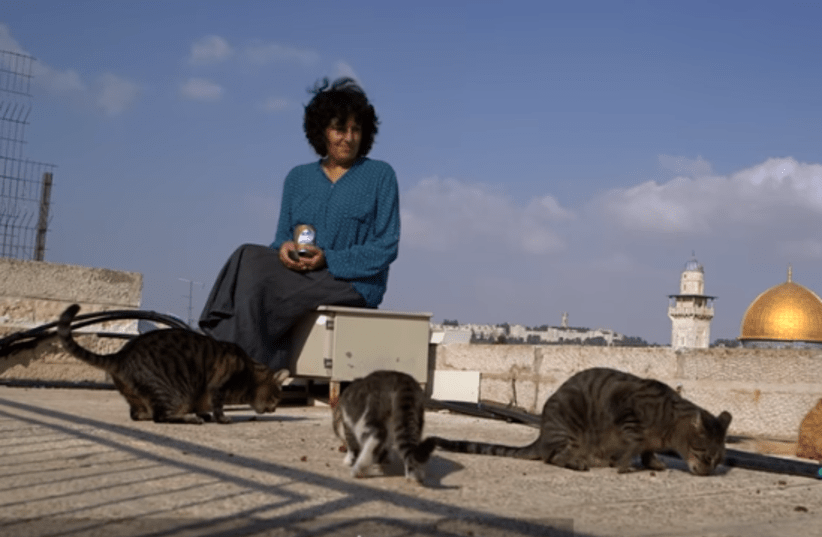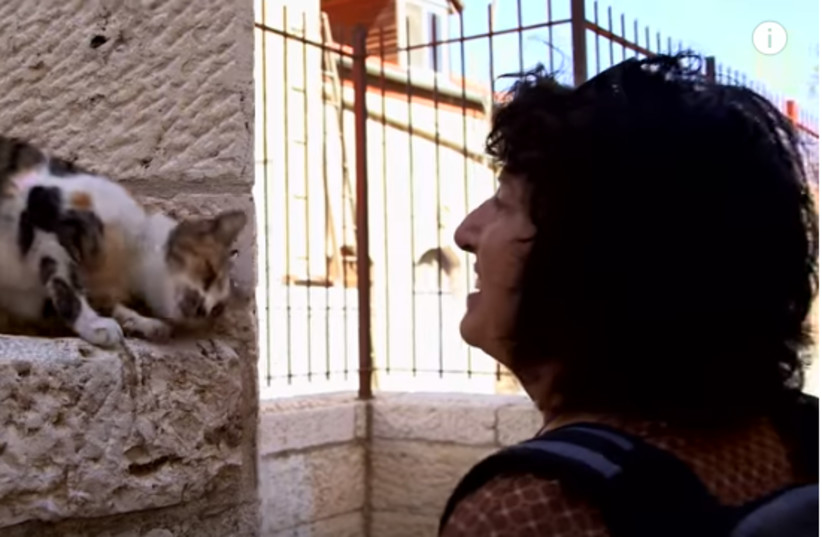Just about everybody in the Old City – Jewish, Muslim, Christian – knows what to do when they find a cat or kitten in distress: Call Tova Saul.
A resident of the Jewish Quarter since 1984, Saul is one of several “queens of animal rescue” in Jerusalem. She rescues 40 to 50 kittens a year, some too sick to survive.
“I really don’t want to rescue cats and don’t enjoy it, but if I don’t, no one else will.”
Tova Saul
“I really don’t want to rescue cats and don’t enjoy it, but if I don’t, no one else will,” she explains. “I can’t live in an ocean of suffering that is invisible to others.”
While many people pass by and ignore sick, hungry kittens crying for their mothers, others bring them to Saul or tell her where to find them.
“Some go straight to the vet. I have the best vet in the world, Dr. Boaz Avram. Two years ago I went 92 times to clinics with sick cats; last year, 111 times. That’s more than once every four days!” she says.
Aside from the cats she keeps (currently, six cats and four kittens), she drives all over Israel delivering rescued and recovered cats to adoptive homes. She even finds homes in other parts of the world.
Recently, she spearheaded the complex rescue of a kitten trapped in the ceiling of the gym of the Jerusalem YMCA. That cat was flown to a new home in Las Vegas.
Her very public persona has won her a lot of friends in all quarters, literally, who call on her for cats in need. She often invites Armenian, Arab and Christian friends for Shabbat meals.
Looking for a dog
Saul grew up in Pittsburgh. She says that she absorbed the value of compassion for animals, as well as Zionism, from her mother.
She earned a master’s degree in social work and got a job in Baltimore at an institution for troubled youth.
She was raised in a Conservative household, but in Baltimore she ended up in “a very yeshivish neighborhood, and everyone was inviting me for Shabbat. I’d sit with the rebbetzin and talk about the meaning of life. I’d see the learning that was going on, even haredi men learning Talmud with their daughters. I realized this is what I was missing all my life. I loved it.”
So when her job, her car, her roommates and her love life all began falling apart after three and a half years in Baltimore, she booked “a one-way ticket to the wild blue yonder,” with her first stop in Israel.
“I was planning to stay four to six months at Neve Yerushalayim. I decided that if I didn’t find the man of my dreams within six months, I’d leave and go backpacking in Asia or Africa, volunteering in wildlife sanctuaries and orphanages.”
Although she didn’t find her dream guy, she remained in Israel.
“As a kid, I thought that college was a black box that you entered and something happened there to make you wise; the best person you could be. But really it was only like high school – absorbing facts and taking tests. Upon entering seminary at Neve, I realized that this was the black box,” she says. “I learned things I could take into my bones and use the rest of my life.”
Center of the world
Musician Moshe Yes hired Saul to work in his café-outreach center in downtown Jerusalem. From there, she was recruited to manage a similar venture, the Oasis Café in the Old City, run by Rabbi Meir Schuster.
There she met someone looking for a roommate, so she moved in, later buying the apartment – where she still lives today.
When Oasis closed, she became a counselor in Schuster’s Heritage House, an Old City hostel for young Jews exploring their Judaism.
“I’ve had a great life here. It’s really the center of the world and certainly the center for tourism in Israel,” she says, which is one reason she became a licensed tour guide.
And she soon established herself as the Old City’s cat angel.
In addition to feeding and caring for them, she is a strong proponent of the trap-neuter-release (TNR) method of animal population control. She has brought more than 1,000 street cats to be neutered since moving to the Old City.
“Many people are feeding street cats without spaying them. Since the vast majority of kittens die from starvation, feeding them causes a huge cat population explosion in one small area because then most of the kittens survive. This is terrible for cats and for neighbors,” she explains.
Though sterilizing animals is problematic in Jewish law, several prominent rabbis allow street cats to be neutered under certain conditions. Saul says that one authority even said, “It’s not only permissible but a mitzvah.”
Donors helped Saul purchase a small electric vehicle, which she calls her “spaymobile,” giving her access to the narrow alleys of the Old City to trap and release cats.
“Most people are unaware of what goes on in animal shelters. Tens of thousands of dogs and cats, puppies and kittens, are euthanized every year here and all over the world because humanity can’t adopt so many. This is something crucially important to teach kids in schools.”
Tova Saul
Supporters across the world
“Most people are unaware of what goes on in animal shelters. Tens of thousands of dogs and cats, puppies and kittens, are euthanized every year here and all over the world because humanity can’t adopt so many. This is something crucially important to teach kids in schools,” says Saul, who hopes to work with a filmmaker on a documentary geared to schoolchildren everywhere.
She makes and posts videos of her rescue stories. She has supporters and YouTube followers in several countries, including tourists who use her tour-guiding services or stay at her place through Airbnb.
“A few years ago, a couple from Holland was visiting and found a blind kitten. They looked on the Internet about whom to call, and the person they called told them to bring me the kitten. Later they gathered a group of eight or 10 Dutch people, who together donate toward my expenses every month,” she says. “I also have donors in America. An American friend is now starting a tax-exempt organization for me.”
Money for animal welfare is always an issue, on the municipal level as well.
“The city needs more vets and larger clinics,” says Saul. “There’s been a great improvement in the past decades. It’s very encouraging, but we’re a long way from perfection.”■
There are dozens of Israel animal rescue Facebook pages, most of them in Hebrew. Some English ones include Olim Love Animals; Israel Animals for Adoption; 9neshamot; Animal Rescue Team – Tel Aviv; and Cats in Need of Rescue.
Tova Saul From Baltimore to Jerusalem, 1981

